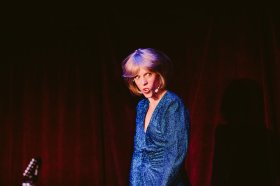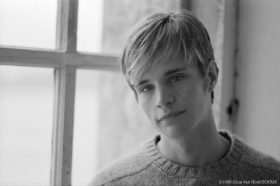This Melbourne Symphony concert saw a piccolo vying for line honours with a coloratura soprano and a firebird – thankfully, not all at the same moment.
Interestingly, none of them featured in the title work, Appalachian Spring, Copland’s original Suite based on his ballet of the same name. Program notes by Gordon Kalton Williams explained that the ‘spring’ of the title refers to water, not to the season – however much Melbourne might be longing on the night for relief from its chilly winter.
With a chamber group of 13 (including piano) this was the simplest of the four works on the program, but it had a quiet appeal. It evoked the pioneer days in America, but in a much gentler manner than some of Copland’s works, such as Rodeo – perhaps because the central figure in the original ballet was the Bride, and because of the importance of the wind instruments.
The string players appeared to relish the contrasts, sudden increases in tempo, and syncopation in company with piano, bassoon and other winds. Even the final theme, the hymn known as Simple Gifts, had an energy that carried through to a more subdued ending.
Copland dominated the first half of the program, as soprano Emma Matthews, in a brilliant blue gown, joined a larger contingent of the MSO (and the piano gave place to a harp). Matthews performed eight songs, with words by Emily Dickinson, revealing them to be uniquely beautiful works.
The first, Nature, the gentlest mother, had a deliberate, flowing style that suited Matthews’ voice: full, rich and with the ability to sustain very long notes. The second, There came a wind like a bugle, showed an imaginative scoring for trumpet to evoke the sound of rushing winds. Its slightly more atonal, 20th century sound appeared more recognisably Copland, although Matthews met it with the same measured, strong approach that characterised her performance of all the songs.
The operatic soprano’s powerful voice was put to effective use in the songs, Dear March, come in! and Sleep is supposed to be, the latter with a magnificent last note. There was another in the final The Chariot, one of Dickinson’s best-known poems (‘Because I would not stop for Death’). Everything about this performance was perfect, the instrumentalists beautifully supporting Matthews through to an almost impossibly drawn-out note to end.
After interval there was excited anticipation as composer Paul Stanhope introduced his own work, the concerto for piccolo flute and orchestra. Commissioned by Symphony Services International on behalf of the Melbourne, Adelaide and Tasmanian Symphony Orchestras, this was to be its world premiere performance.
New works, and particularly premieres, evoke a mix of excitement and apprehension in an audience. But, from the moment soloist Andrew Macleod joined his MSO colleagues on stage (with Benjamin Northey in masterful control of the orchestra) there was only excitement – and awe.
The work is in two parts: Hymn (with fragments of John Ireland’s tune, My song is love unknown) and then Scherzo – which the composer’s own notes reveal as ‘Italian for “joke” [or] a fast-moving humorous piece’. Even without hearing the music, it was clear that this was intelligent programming that would most likely sit well with the Copland we had just heard.
Stanhope’s concerto had the sweep, excitement and even emotional depth that one associates with 20th century American music, reminiscent at times not only of Copland, but also Bernstein and perhaps even Gershwin. This is not to detract in any way from Stanhope’s achievement, nor to suggest this was in any way a pastiche.
On the contrary, this was original, captivating music that proved the piccolo to be a worthy solo instrument. In Macleod’s hands it trilled and soared above the full orchestra augmented by an array of percussion instruments. (So busy were the performers that one ran between his cowbells and other instruments clutching his sheet music!).
Yet the piccolo retained the charm that makes it a popular instrument for marching bands and the like. And if there was any doubt about its ‘worthiness’ in comparison with other (larger) instruments, Macleod’s piccolo shone in a long solo cadenza halfway through the Scherzo, showing off possibilities for the instrument that are rarely exploited.
My neighbour in the audience summed it up: ‘That is a concerto that will now be played all over the world’. I couldn’t say it better – and its success will be well deserved.
Finally, the MSO played Stravinsky’s Firebird Suite. At any other concert this would receive plenty of attention in a review, being a work that challenges an orchestra on so many levels. It was no surprise that Melbourne’s great orchestra, and maestro Northey, did not disappoint, evoking the glorious bird (and other characters in the story) with music that ranged from the lyrical to the exhilarating.
In all, the piccolo, the soprano and the firebird – and, of course, the orchestra – made this an exceptional night.
Rating: 5 stars out of 5
Appalachian Spring
Melbourne Symphony Orchestra
Benjamin Northey – Conductor
Emma Matthews – Soprano
Andrew Macleod – Piccolo
Copland Appalachian Spring: Suite (original version)
Copland Eight Poems of Emily Dickinson
Stanhope Piccolo Concerto* WORLD PREMIERE
Stravinsky The Firebird: Suite (1919)
Hamer Hall, Melbourne
6 – 7 June





